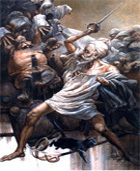Back The Novel
"In a village of La Mancha, the name of which I have no desire to call to mind, there lived not long since one of those gentlemen that keep a lance in the lance-rack, an old buckler, a lean hack, and a greyhound for coursing..." thus begins the most treasured gem in Castilian literature, published in the year 1605 by Miguel de Cervantes Saavedra.
A novel that has triumphed worldwide and is perhaps, together with the Bible, the work that has been translated into more languages than any other. Moreover the characters from its pages have come to be veritable archetypes on a universal scale: Don Quixote, the idealist and dreamer; Sancho Panza, the loyal companion, practical and something of a fatalist.
Brief outline

Don Quixote tells the story of a gentleman of rank from La Mancha who, from so much reading of tales of chivalry, goes insane and believes he is a knight-errant.
"...he became so absorbed in his books that he spent his nights from sunset to sunrise, and his days from dawn to dark, poring over them; and what with little sleep and much reading his brains got so dry that he lost his wits."
He leaves his village three times seeking adventures and "to set wrongdoings to rights", confusing reality with fiction and for the most part taking a thrashing. He finally returns home, gets sick, recovers his wits and dies.
Between his first sortie and his ultimate return to the hamlet, a whole series of small incidents are chronicled that our protagonist turns into authentic chivalrous episodes, though not always due to his own lunacy.
"The barber was all this time on his knees at great pains to hide his laughter and not let his beard fall, for had it fallen maybe their fine scheme would have come to nothing..."
Freedom
But what Cervantes advocates, and the reason why Don Quixote has become an immortal novel, besides the exceptional care taken with the language spoken by each of the characters, is his belief in FREEDOM. This topic appears continuously throughout the whole book, prompted by the years of captivity that Cervantes spent in Algiers:
" - Freedom, Sancho, is one of the most precious gifts that heaven has bestowed upon men; no treasures that the earth holds buried or the sea conceals can compare with it; for freedom, as for honour, life may and should be ventured; and on the other hand, captivity is the greatest evil that can fall to the lot of man."